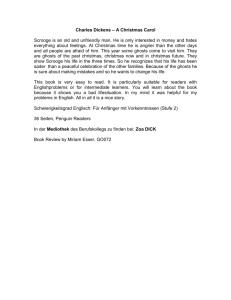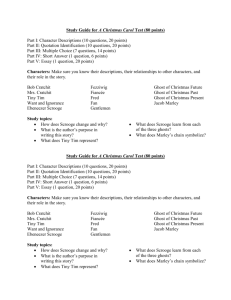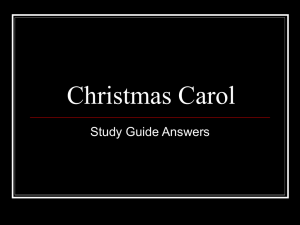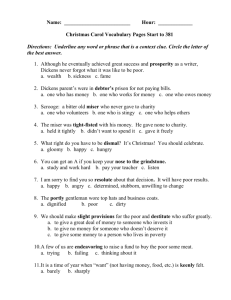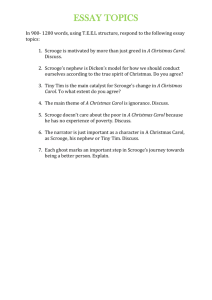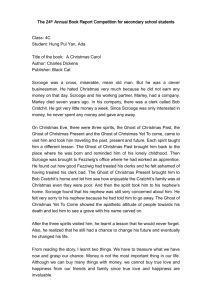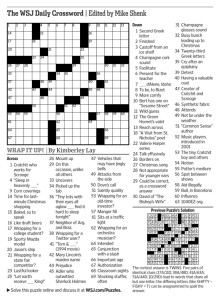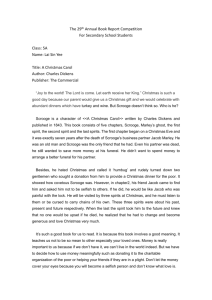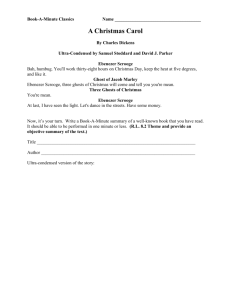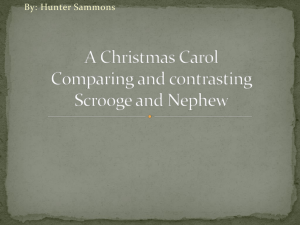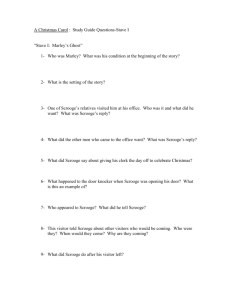The Christmas Carol
advertisement
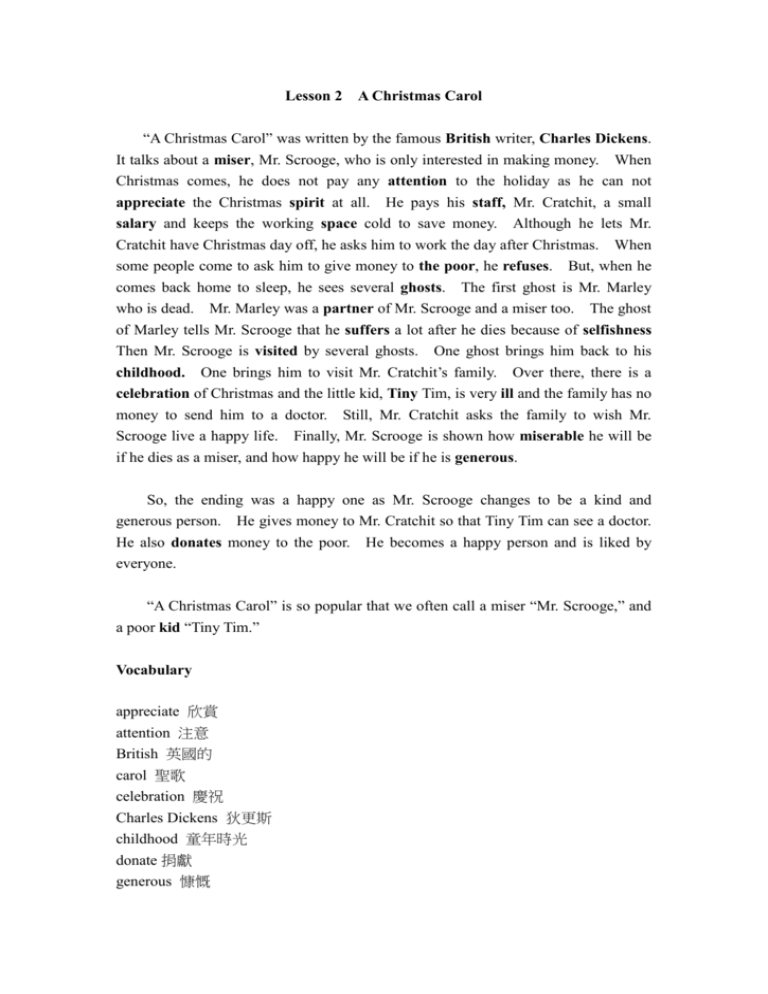
Lesson 2 A Christmas Carol “A Christmas Carol” was written by the famous British writer, Charles Dickens. It talks about a miser, Mr. Scrooge, who is only interested in making money. When Christmas comes, he does not pay any attention to the holiday as he can not appreciate the Christmas spirit at all. He pays his staff, Mr. Cratchit, a small salary and keeps the working space cold to save money. Although he lets Mr. Cratchit have Christmas day off, he asks him to work the day after Christmas. When some people come to ask him to give money to the poor, he refuses. But, when he comes back home to sleep, he sees several ghosts. The first ghost is Mr. Marley who is dead. Mr. Marley was a partner of Mr. Scrooge and a miser too. The ghost of Marley tells Mr. Scrooge that he suffers a lot after he dies because of selfishness Then Mr. Scrooge is visited by several ghosts. One ghost brings him back to his childhood. One brings him to visit Mr. Cratchit’s family. Over there, there is a celebration of Christmas and the little kid, Tiny Tim, is very ill and the family has no money to send him to a doctor. Still, Mr. Cratchit asks the family to wish Mr. Scrooge live a happy life. Finally, Mr. Scrooge is shown how miserable he will be if he dies as a miser, and how happy he will be if he is generous. So, the ending was a happy one as Mr. Scrooge changes to be a kind and generous person. He gives money to Mr. Cratchit so that Tiny Tim can see a doctor. He also donates money to the poor. He becomes a happy person and is liked by everyone. “A Christmas Carol” is so popular that we often call a miser “Mr. Scrooge,” and a poor kid “Tiny Tim.” Vocabulary appreciate 欣賞 attention 注意 British 英國的 carol 聖歌 celebration 慶祝 Charles Dickens 狄更斯 childhood 童年時光 donate 捐獻 generous 慷慨 Aghosts 鬼魂 ill 生病 kid 小孩 miser 小氣的人, 自私的人 miserable 悲慘 partner 伙伴 refuse 拒絕 salary 薪水 selfishness 自私(名詞) space 空間 spirit 精神 staff 下屬 suffer 受苦 the poor 窮人 tiny 小 visit 訪問 More Sentences 1. I am interested in music. 2. He is interested in swimming. 3. 4. 5. 6. 7. 8. 9. 10. 11. He pays a lot of attention to his students. He keeps his house warm in winter. He keeps his bedroom clean. He does not let his son play computer games for too long. We should ride bicycles to save energy. My teacher asks me to work hard. He refused to answer any question. I have never seen any ghost. I do not believe in ghosts. 12. 13. 14. 15. 16. 17. 18. 19. He died last year. He was a good partner of mine. He suffered when he was sick. Everyone suffers because of the war. He is well liked because of his kindness. He is visited by his children very often. There was a celebration of New Year. He is very ill. 2-2 20. He has no money to buy books. 21. 22. 23. 24. 25. He was shown a picture of his mother. He will succeed if he works hard. He will fail if he does not work hard. Mr. Chang often donates money to the poor. He is well loved by his family. Points of Grammar 1. He is interested in, “interested” 是一個過去分詞(past participle),我們可以將這個字看成一個形容詞, 是有興趣的意思.要注意的是我們不可以說 ”I am interesting in”,而一定要說 “I am interested in”. 以下的句子是錯的: *He is interesting in music. *I am not interesting in playing piano. 正確的句子如下: He is interested in music. I am not interested in playing piano. 2. interested in making money 為什麼要用”making”呢?這是因為”in”的後面,一定要跟一個名詞,”make”是一個動 詞,不是名詞,因此我們必須加上”ing”,使它變成動名詞(gerund). 以下的句子是錯的: *He is in favor of walk. *He is interested in make money. *I am afraid of watch violent movies. 正確的句子如下: He is in favor of walking. He is interested in making money. I am afraid of watching violent movies. 2-3 3. because of selfishness “because of”的後面一定要跟一個名詞,”selfishness”是一個名詞. 如果用”because”,這句話應該是”because he is selfish”.也就是說,”because”的後面, 必須跟一個整句 clause. 以下的句子是錯的: *He is rich because of his father is rich. *It is cool now because of it rained yesterday. *I do not like him because his selfishness. *He is successful because his hard work. 正確的句子如下: He is rich because his father is rich. It is cool now because it rained yesterday. I do not like him because of his selfishness. He is successful because of his hard work. 4. Then Mr. Scrooge is visited by several ghosts. 這句話是被動語氣.主動的句子是”Several ghosts visit Mr. Scrooge.” 5. he lets Mr. Cratchit have Christmas day off ”let”後面的動詞是要將”to”省略掉的.如果說”let him to have”就不對了. 6. the poor “the poor” 泛指所有的窮人.是一個名詞,也是多數的名詞. “the poor”指富人,”the learned”指有學問的人. Translate the Following Sentences into English 1. 2. 3. 4. 5. 6. 7. 8. 這本書是我爸爸寫的. 他對拉小提琴有興趣. 他對唸書沒有興趣. 他們很關注他的學生們. 他將他的車子保持得很乾凈. 他不讓他的兒子游泳. 我們應該常常走路去工作以節省能源. 窮人常常受苦. 2-4 9. 因為他很仁慈,大家都喜歡他. 10. 他沒有錢看電影. 11. 如果天下雨,你就要帶一把傘. 12. 他從不捐錢給窮人. Correct the following Mistakes: 1. 2. 3. 4. This book written by me. He is interesting in music. He is tired because of he works too hard. He is successful because his hard work. 5. Do not let him to go out. 6. He is interested in swim. 7. He is widely hated because of his selfish. 8. He has no money buy a car. 9. He often donate money to the poor. 10. He visited by his son yesterday. 2-5
